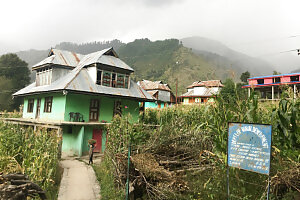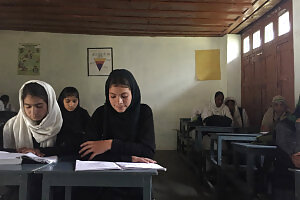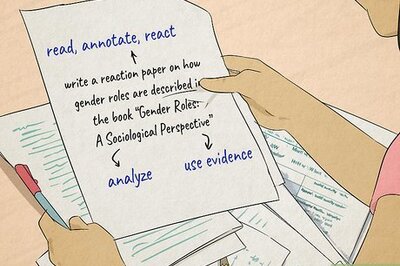
views
Poonch: A few days after August 5, when the central government ended Jammu and Kashmir’s special status and reorganised the state into two union territories, over two dozen boys and men from Gagrian village in Poonch district took out a rally. They were shouting slogans like ‘Markazi sarkaar hosh mai aao’ (Central government, come to your senses) and ‘Aawaaz do, hum ek hain’ (Raise your voice, we are united).
Poonch is a remote region in the Himalayas. The mountainous territory, once part of Alexander the Great’s conquests, got split during the 1947-48 war between India and Pakistan. One part is now occupied by Pakistan and the other is a district in Jammu and Kashmir.
Once at a crossroads, Poonch town is now on the periphery.
Around 45 kilometres to the north-east of the town is Gagrian village. Most of the residents live in dokhs – houses in the mountains made of mud and wooden logs. The area has huge military presence. On the mountains, overlooking Gagrian, is the Line of Control (LoC).

There were curfew-like restrictions in the village, locals said, for over a week after August 5, something they had witnessed for the first time. The remoteness of the area can be appreciated from the fact that residents say mobile phones started working here only eight months ago.
People here, who till last year relied on the two PCOs in the village, were still learning the world of internet when authorities snapped communication services. Phone connections were restored after a month but locals say internet remains offline like in some other parts of Kashmir.
Most of the around 15,000 population here is engaged in growing corn or working as porters with the Army. Locals participate in large numbers whenever there are elections. No one remembers any protest or shutdown here in the past. But, since the August 5, the mood in Poonch has undergone change.
“This village is ringed by the Army; the number of soldiers is around the same as that of locals,” said Mohammad Akram, who started the first tea stall in the village around 25 years ago. Akram, 60, says the people have never been hostile with the Army, but since August 5 they have been a bit apprehensive.
After initial restrictions, life in Gagrian and other parts of Poonch town is almost normal. The markets are abuzz and people are doing their usual chores.
The government has said it is committed to the development of Jammu and Kashmir and changes to Article 370 of the Constitution have removed impediments in the way.
However, some locals here say there is insecurity about their identity.
“Around 90 per cent of the population here is Muslim. But we are feeling a bit disquieted,” said a resident on condition of anonymity.
Tucked in the mountains is the Government High School in Gagrian, the last one near the LoC. Just living here can be a challenge. Going to school and getting educated is an even greater one.
Aneesa Akhtar, a class 10 student, treks for two hours to reach school from Dhanna, a small hamlet situated near the LoC. It also takes her two hours to go back. Most of the girls of her age in her neighbourhood have stopped going to school. They have either got married or are engaged in household chores.

But Akhtar wants to study and, her father, who works as a labourer with the Army, is also supportive. However, the road is a tough one.
“When I leave home every day there is fear of wild animals,” said Akhtar, donning a black abaya, a robe-like overgarment. But more than that, flare-ups between Indian and Pakistani forces at the LoC worry her more.
Akhtar says she wants to be a teacher. The reason: her parents will support this profession and she will be able to teach children in her locality.
The fence of the LoC is clearly visible from the school. Even the gunpoint range, from which the Indian Army retaliates to Pakistani assaults, is right below the school.
“During the cross-LoC shelling, this looks like a war zone,” said Akhtar, who has seen a friend being hit by mortar shell in firing a few years ago. “She was injured and then died in a hospital.”
The LoC shelling is a regular affair. Government data shows that there have been about 7,000 ceasefire violations by Pakistan along the LoC and the International Border in Jammu and Kashmir in the past seven years.
“We often hear loud bangs. Mortars land here. What you call peace in a normal place doesn’t apply here,” she said, with a sarcastic grin.
In Akhtar’s school there are 232 students—110 girls and 120 boys. “All the students have to walk to the school. For some, it takes 30 minutes and for others up to two hours,” said Vikas Lutra, a teacher here, who himself has to walk six kilometres to and fro every day from the point where a bus drops him and picks him up.
Since August 5, the students have become more anxious.
Akhtar feels that the challenges for her have increased.
“My father doesn’t earn much and I will not be able to go to college which is in Poonch town. So people from the other parts of the country will be more educated than me and they will get jobs, not me,” she said.
Similar thoughts were expressed by Ghulam Qadir, who runs a grocery shop in Rajpora village.
“Our children cannot compete with the students of Delhi or any other place. They have to trek for two hours to reach a school,” he said. “How will our children go for higher studies?”
Qadir, who is in his mid-60s, is a father of five. His eldest son who is a college graduate is working as a daily wager with a government department. But, Qadir says, he hasn’t received any salary in a while. His second son is a postgraduate and has moved to Saudi Arabia where he is working as a domestic help. Looking at his two brothers, Qadir says, his youngest son dropped out of school and started working as a labourer in Himachal Pradesh. He has two daughters and they have also dropped out of school.
Like Kashmir valley, the government rushed additional troops to Poonch before August 5. According to police sources, 40 companies of paramilitary forces were sent to the district.
Now, things are returning to normal. But Shameem Ganai, a second-time sarpanch from Mandi area of Poonch, says some things have changed. Every year, hundreds of people, including him and his family, would go to attend the Independence Day function.
“We would take the tricolour in our hand and go to the ceremony. But this year no one in my family and no one from our village celebrated,” Shameem said.
On the government’s promise to bring development to J&K, he said: “We live on the LoC and development for us means when the guns fall silent here.”
The road leading to Aala Peer locality in Poonch town presents a splendid view of the site, as a captured aircraft from the 1965 India-Pakistan war remains placed in the brigade headquarters. Former legislator of the constituency, Shah Mohd Tantray, said, “A void has been created. A big void which can’t be filled now. We all are helpless.”
Locals say in Poonch district authorities have taken nine people into custody under the Public Safety Act (PSA), something which has happened for the first time in this area. Among them five people are from Mandi.
One of those detained is Altaf Hussain (60), says his family, who retired as a government school teacher five months ago.
Hussain’s son, Aaftab, said they initially didn’t know about his arrest.
“When we went to the police station, we found that he had been slapped with PSA and shifted to Kotbalwal jail in Jammu,” said Aaftab, denying the charges that his father raised pro-freedom slogans and pelted stones. “I have four sisters at home and my father used to take care of the family. Now, it’s up to me.”



















Comments
0 comment